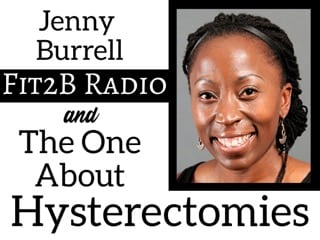EP 33 – The One About Hysterectomy With Jennifer Burrell
Hysterectomies… the word alone is enough to make some shudder while others get excited at the thought of no more periods. How simple are they? What’s the recovery like? Are there alternative treatments when endometriosis or leaky bladder is the reason for considering one? And what happens to the cervix? Women need to ask more questions if they’re being told a hysterectomy might be in their futures, so we talked Jenny Burrell, a women’s fitness expert who has actually had one and written two online courses that cover this subject.
Click here for Jenny’s Optimal Health After Hysterectomy
Click here for 3rd Age Women Global Online Certification (which is what Beth is finishing)


I really “enjoyed” this one (are we supposed to enjoy talking about hysterectomies? lol), thinking through lots of things as my own complete hysterectomy was in 2012. Y’all covered a difficult topic with grace and wisdom and the right amount of humor. Thank you for all you do!
I recently had a gynecologist appointment to discuss repairing an old episiotomy that somehow painlessly opened years later. The first doctor I saw brushed me off, so I went in wanting answers and options. I was caught off guard when the doctor suggested I see a uro-gynecologist to repair the episiotomy, along with repairing a cystocele and rectocele, and since I am perimenopausal and having some heavy bleeding, I could go ahead and have a hysterectomy also. I was overwhelmed with all of these options, instinctively not wanting a hysterectomy, but my mind was spinning as to why. Here are some questions I plan on asking at the uro-gynecologist appointment in a month.
1. What is the level of prolapse of my bladder and bowel? What is the measurement/scale used?
2. My OB said my uterus is in a “good place” in terms of prolapse. How would removing the uterus help me in my cystocele and rectocele repair?
3. What does the uterus do for my body and for my hormones during perimenopause, entering menopause, and for the rest of my life post menopause? What could happen to my body and hormone levels and overall life if I remove my uterus at age 48?
4. If I have a hysterectomy at the same time as the episiotomy repair and repair of the rectocele and cystocele, will I have a higher chance of all pelvic organs prolapsing in a worse way later in life because the bladder, bowel, and uterus are all connected and “help” hold each other up?
5. If I have a hysterectomy, what happens to my cervix and vagina? What happens to my ovaries?
6. Is mesh used in repairing the cystocele or rectocele? If so, what are the chances of a poor outcome with mesh. What are the differences between using the mesh and not in this surgery? Also, is there danger of injuring nerves in the cystocele and rectocele repair that could affect. intimacy and ability to enjoy sex?
7. If I have mild symptoms of pressure after a long day from the prolapse, is that a reason to repair the cystocele and rectocele now? Or can I wait until later in life when I have worsening symptoms?
8. Pelvic floor physical therapy has helped my uterus stay where it needs to be. It’s just hard to do the exercises with the episiotomy open and muscles that should be connected, not connected. If I only have the episiotomy repaired, which is a must and my #1 concern, can I be prescribed additional pelvic floor PT to maintain and possibly improve the prolapse I have?
9. What is the procedure to repair the episiotomy? Is there risk of my vagina being “too tight” after? What are the risks of hurting a nerve that could impair my sex life?
Thank you so much for spelling out those brilliant questions and insights. I hope lots of people use them and get the help they need!